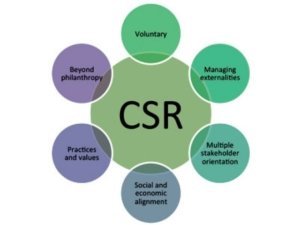In engaging with the publics and its customers to get goodwill, companies use different platforms and strategies. One of such is the execution of Corporate Social Responsibility (CSR) projects and programmes. Many Nigerian organisations are also not left out in this regard.
Although many corporate entities have been executing CSR projects and programmes over the years, some public relations and CRS experts have argued that such programmes and projects couldn’t be truly classified as CSR efforts. To them, such projects, when executed are geared towards further boosting an organisation’s profitability instead of providing answers and alleviating problems in a given community. At best, they argue that such projects could only be better described as philanthropy or giving back to the community.
It is often said that most of the firms only execute programmes that give them immediate returns and media mileage. When such efforts do not yield such fruits, they are usually not willing to commit further resources into them for continuity.
Recently, at an event meant to reward companies committed to CRS programmes and projects in Nigeria, the award promoter noted that Nigerian businesses should be commended for its commitment to CSR projects, as CSR spend has grown by about 1000 percent in the last decade.
While speaking at the annual SERAs Awards, Mr. Ken Egbas said about N47.8 billion was spent on CSR programmes by Nigerian firms last year. According to him, when the award started eight years ago, only N600,000 million was the aggregate one-year spend on CSR.
He maintained that CSR has become a critical part of businesses in Nigeria because organisations now know that they need it to survive and gain mileage in society.
Ironically, within the last one decade that CSR spend has grown by about 1000 percent, there had been increased complaint of poor services and product satisfaction by end-users. Yet, an organisation that is truly committed to corporate social responsibility should know that it starts from within the organisation in terms of the quality of the services and products it offers the market.
Asked to examine the CSR sector in Nigeria, Lead Consultant/CEO, ThistlePraxis Consulting Limited, an organisation committed to sustainable CSR issues, Ini Onuk, said that she would rather attempt to describe the pulse of the sector at the moment because although there are indeed many organisations with intent to do CSR, they are largely misled or ill-advised and as such they are still stuck with philanthropy and charity.
She disclosed that her company has substantially contributed and invested in awareness, information resource and elevated the discourse of CSR to promote its international tenets and principles as well as its proper integration into organisational strategy.
“But in spite of this, there are very a few organisations that are retroactively integrating CSR but do little or nothing to report their activities. This is because they want to shy away from a false perception of increased scrutiny and expectations, which may be accompanied by more demands from stakeholders.”
She said, “In addition, CSR is still the most popular concept and this makes sustainability a more holistic approach of competitive value and social responsibility, which are inherently the same but practised across public and non-profit sectors, more distant. Due to the absence of regulation on practice spend or even reporting, CSR is yet to attain the needed level of compliance to drive widespread impact.
“At the moment, only the financial services subsector is adequately regulated by CBN through Nigerian Sustainable Banking Principles (NSBP). Other key sectors begging for regulation include oil and gas, manufacturing, logistics/transport/haulage, service delivery, telecoms, etc.”
In summary, Onuk argued that while CSR is growing very slowly, it is still far from its potential due to the size of the country’s economy and relevance of the business environment across the continent and in the world.
To her, what is required to maximize the potential in the sector is a national framework on CSR to guide organizations, across public, private and non-profit sectors, on a minimum compliance level and reporting standard in order to mobilize substantial contributions and impact to sustainable sevelopment.
And with the acclaimed growing spend on CSR projects and programmes but poor services, products and customer satisfaction, Onuk felt that what is not being taken into cognisance by Nigerians, including media professionals, is determining how much organisations really spend on CSR projects.
According to her, “That is the only sensible explanation for the purported increase in spends, yet dwindling impact and lack of improvement on service delivery across board. From our independent observation, we have ascertained that many organisations inflate their spends on CSR to lobby for tax rebates, compete for awards albeit in an almost non-structured industry and promote their brand reputation and goodwill. What is seemingly amiss is what the media – as whistle-blowers and report readers – must assist the industry to reconcile”.
Also speaking on the claim of growing CSR spend in Nigeria in the midst of poor consumer satisfaction, Principal Consultant, Integrated Indigo, a public relations firm, Bolaji Abimbola, said the organisers of SERAs Award must have data to back up such the claim. He noted that though CSR is about doing good, it should definitely not be at the expense of the quality of goods and services delivered to the customers.
He argued that there was no amount of CSR project that could help project good public perception and image for any company offering poor services to its customers, noting, “I think it is a case of misplaced priority for organizations to neglect their core responsibility to their customers or consumer by delivering poor value and quality service and spend heavily on CSR.
“From a strategic PR point of view, I think it is better for such companies to redirect such investment into ensuring that their customers are satisfied first before thinking of buying goodwill through CSR.
“This is because when the chips are down, the customers will not stick with you based on the amount you invest in CSR but rather based on the quality of service that has been rendered vis-a-vis competition in the marketplace. This is not in any way to undermine the importance of CSR as a veritable PR tool to seek, win and sustain public goodwill”.
On why Nigerian organisations place more emphasis on community development above customer satisfaction, which should be the primary reason for setting out, Abimbola noted that he would not want to jump into hasty conclusion because what was seen from the outside might not be the true reflection of what the companies were doing internally to ensure customer satisfaction.
“For instance, we may not have the figure/value of what a telecoms company is investing in service upgrade and improvement to ensure better services, but some of us are privy to the CSR spend,” he said. “It may be erroneous to then conclude that they are actually giving more attention to CSR than customer satisfaction.
“You may be shocked that the CSR spend may not necessarily represent one per cent of the spend to improve quality of service unless we are advocating that companies should completely jettison CSR until they achieve the impossible 100 per cent customer satisfaction”.
On his part, another Public Relations Practitioner, Mr. Lekan Babatunde, felt it incongruent to have CSR growing while the primary service of organizations to its customers was ebbing. He noted, “For me such situation will always have an adverse effect on the company in the long run. This becomes evident at the brand’s moment of truth. This is the critical time when the consumer takes the decision because he experiences what the brand is or offers first hand, unmediated.
“He becomes rational and follows his heart based on the experience he has with the brand. So, if the CSR budget goes up and the primary service to customers is neglected, it portends a bad omen for the brand or organisation that indulges in such unhealthy habits.”
For him, while it is good to be CSR-compliant, organizations must not take customer service for granted. “It should be its reason for being. It is when the business survives and continues to be in business that CSR becomes profitable and beneficiaries can enjoy it the more.
“Customer service is a primary responsibility expected from organizations to its customers while CSR is secondary. You do not put a cart before the horse. It can’t and would never work that way,” Babatunde said.



 If you as a woman were asked to count the stars on your crown that tell the story of each woman you have helped to come up the ladder, how many stars would you have on your crown?. . . This powerful question was posed to me by Ini Onuk, Executive Secretary of WIMBIZ (Women in Management and Business), during the recent interview she granted me.
If you as a woman were asked to count the stars on your crown that tell the story of each woman you have helped to come up the ladder, how many stars would you have on your crown?. . . This powerful question was posed to me by Ini Onuk, Executive Secretary of WIMBIZ (Women in Management and Business), during the recent interview she granted me.